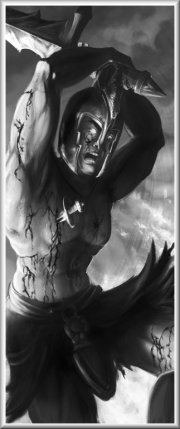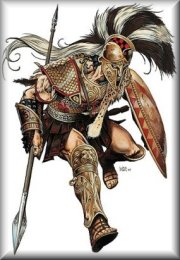
ARES By ALYANA

ARES
CLICK TO ENLARGE
|
ARES PAGE ONE
Ares
was the God of War born in Thrace, and the son of Zeus and Hera,
both of whom, according to the ancient poet Homer, detested him.
He is hateful throughout the epic poem called the Iliad although
it is a poem of war; rarely do soldiers in the Iliad "rejoice in
the delight of Ares’ battle," but far more often they were happy
to "escape the fury of the ruthless god."
Homer calls him murderous, bloodstained, the incarnate curse of
mortals and, strangely, also a coward; who bellows with pain and
runs away when wounded.
Ares had an impressive escort when on the battlefield, his
sister Eris (Discord), her son Strife, Phobos (Alarm), Metus
(Fear), Demios (Dread), Pallor (Terror) as well as the Goddess
of War, Enyo (Bellona in Latin).
These attendants, or sometimes said to be his children,
sympathized with his quarrelsome tastes and were delighted to
follow his lead into battle; as they moved the voice of groaning
arose behind them and the earth streamed with blood.
His sister Eris is always stirring up causes for war by
spreading rumors and creating jealousies. Ares never favors one
city or party more than another but fights for any side,
delighting in the sacking of towns and the slaughter of humans.
Never sated with strife and bloodshed, Ares preferred the din of
battle to all other music, and found delight in the toils and
dangers of war.
No gentle deeds of kindness were ever expected from him; no
loving prayers were ever addressed to him; and the people had no
affection for him, but rather shuddered with terror at the
mention of his name.
The Romans, who glorified war and battle, liked Mars (Roman for
Ares) much better than the Greeks liked Ares. He was never to
them the mean, whining deity of the Iliad, but a magnificent and
invincible warrior.
The heroes of the Aeneid rejoiced when they saw that they were
to fall "on Mars’ field of renown," they "rush on glorious
death" and find it "sweet to die in battle."
The Romans also worshipped Mars and Bellona together, in the
same temples, and their altars were the only ones they ever
polluted by human sacrifices.
Ares has tasted defeat - Athena, a far more skilled fighter than
he, has twice beaten him in battle; and once the gigantic sons
of Aloeus conquered and kept him imprisoned for thirteen months
until, half-dead, he was released by Hermes. Another time
Heracles (Hercules) sent him running in fear back to the safety
of Olympus.
But Ares figures rarely in mythology, and he has no distinct
personality like most other important gods, he was little more
than a symbol of war.
Ares was generally represented in a brilliant suit of armor, a
plumed helmet on his proud young head, a poised spear in one
muscular hand and a finely wrought shield on the other.
There were no Greek cities where he was worshipped. His bird was
the vulture and his animal was the dog.
ARES CONTINUES ON PAGE TWO
LOTS MORE ARES STORIES AND PIX
CLICK HERE!

|







